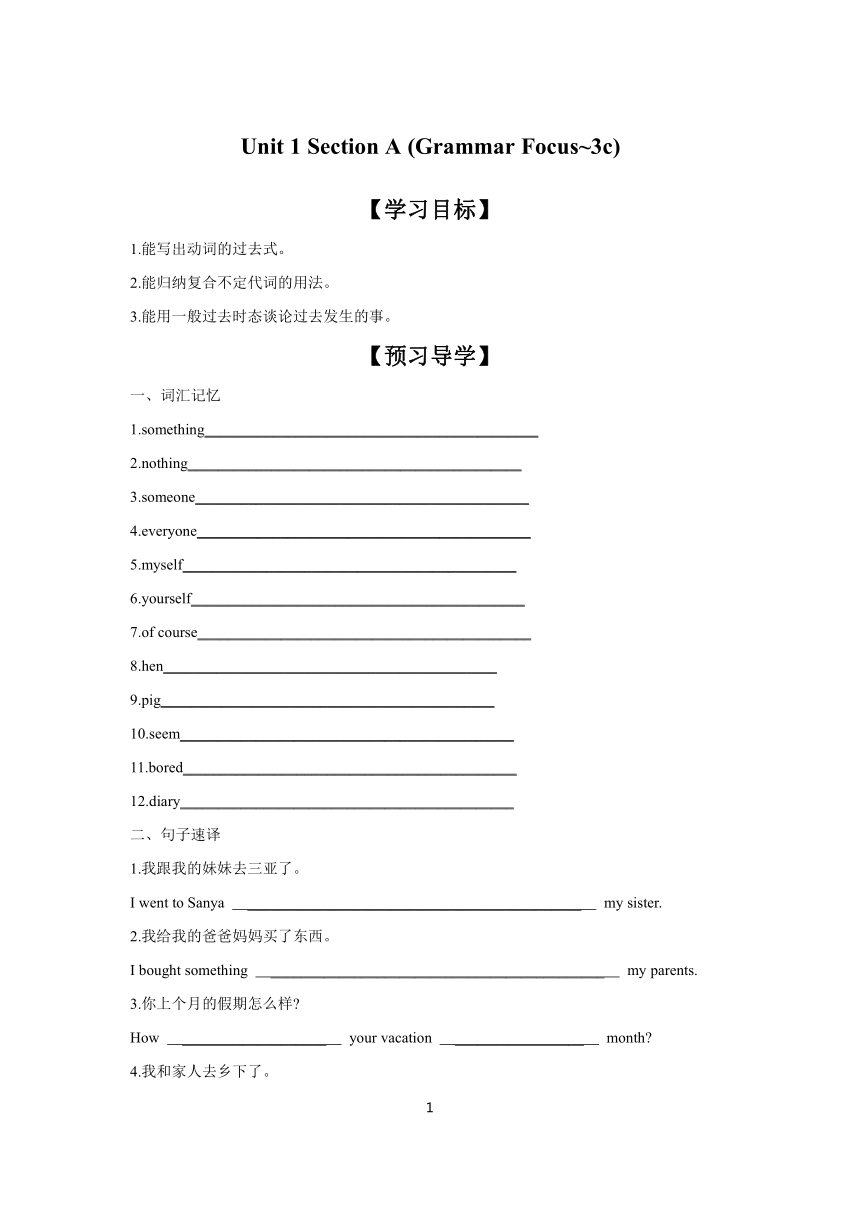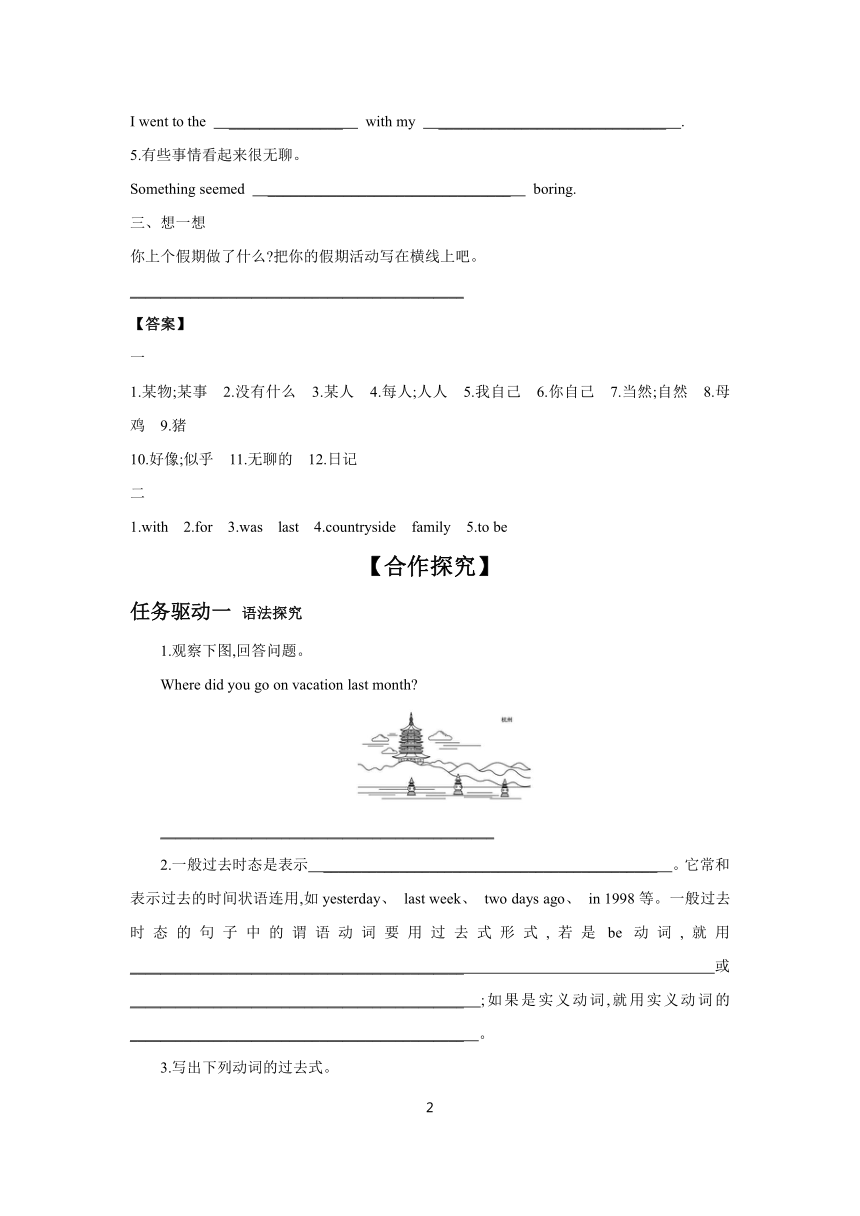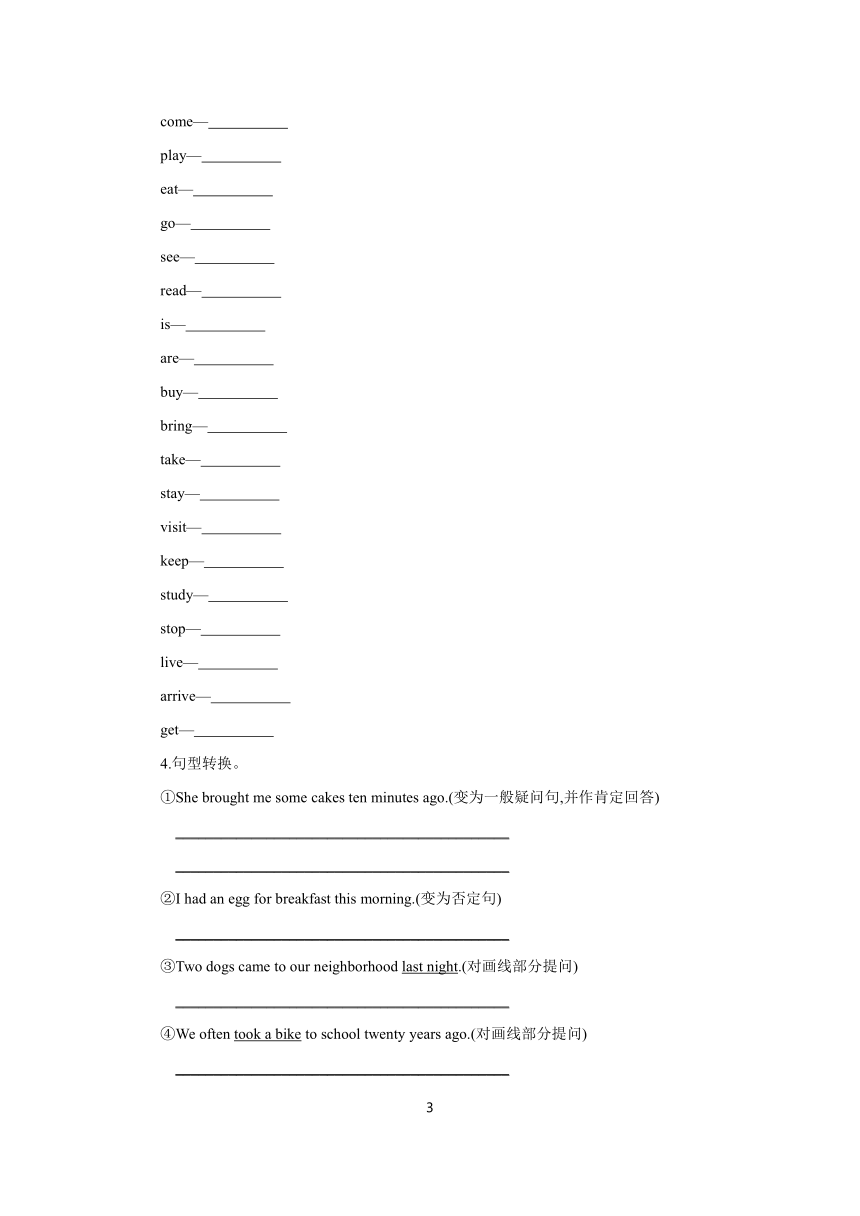Unit 1 Where did you go on vacation? Section A (Grammar Focus~3c) 学案(含答案)
文档属性
| 名称 | Unit 1 Where did you go on vacation? Section A (Grammar Focus~3c) 学案(含答案) |

|
|
| 格式 | docx | ||
| 文件大小 | 37.1KB | ||
| 资源类型 | 教案 | ||
| 版本资源 | 人教新目标(Go for it)版 | ||
| 科目 | 英语 | ||
| 更新时间 | 2024-02-22 14:53:58 | ||
图片预览



文档简介
Unit 1 Section A (Grammar Focus~3c)
【学习目标】
1.能写出动词的过去式。
2.能归纳复合不定代词的用法。
3.能用一般过去时态谈论过去发生的事。
【预习导学】
一、词汇记忆
1.something____________________________________________
2.nothing____________________________________________
3.someone____________________________________________
4.everyone____________________________________________
5.myself____________________________________________
6.yourself____________________________________________
7.of course____________________________________________
8.hen____________________________________________
9.pig____________________________________________
10.seem____________________________________________
11.bored____________________________________________
12.diary____________________________________________
二、句子速译
1.我跟我的妹妹去三亚了。
I went to Sanya ____________________________________________ my sister.
2.我给我的爸爸妈妈买了东西。
I bought something ____________________________________________ my parents.
3.你上个月的假期怎么样
How ___________________ your vacation _________________ month
4.我和家人去乡下了。
I went to the _______________ with my ______________________________ .
5.有些事情看起来很无聊。
Something seemed ________________________________ boring.
三、想一想
你上个假期做了什么 把你的假期活动写在横线上吧。
____________________________________________
【答案】
一
1.某物;某事 2.没有什么 3.某人 4.每人;人人 5.我自己 6.你自己 7.当然;自然 8.母鸡 9.猪
10.好像;似乎 11.无聊的 12.日记
二
1.with 2.for 3.was last 4.countryside family 5.to be
【合作探究】
任务驱动一 语法探究
1.观察下图,回答问题。
Where did you go on vacation last month
____________________________________________
2.一般过去时态是表示 ____________________________________________ 。它常和表示过去的时间状语连用,如yesterday、 last week、 two days ago、 in 1998等。一般过去时态的句子中的谓语动词要用过去式形式,若是be动词,就用 ____________________________________________ 或 ____________________________________________ ;如果是实义动词,就用实义动词的 ____________________________________________ 。
3.写出下列动词的过去式。
come—
play—
eat—
go—
see—
read—
is—
are—
buy—
bring—
take—
stay—
visit—
keep—
study—
stop—
live—
arrive—
get—
4.句型转换。
①She brought me some cakes ten minutes ago.(变为一般疑问句,并作肯定回答)
____________________________________________
____________________________________________
②I had an egg for breakfast this morning.(变为否定句)
____________________________________________
③Two dogs came to our neighborhood last night.(对画线部分提问)
____________________________________________
④We often took a bike to school twenty years ago.(对画线部分提问)
____________________________________________
⑤Lucy and her classmates read English every morning. (用yesterday改写句子)
____________________________________________
任务驱动二 复合不定代词学习
1.齐读课本Grammar Focus中的句子。小组讨论并回答下列问题。
(1)课本Grammar Focus中出现了哪些复合不定代词
____________________________________________
(2)①这些复合不定代词中指人的有 ____________________________________________ 。
②这些复合不定代词中指物的有 ____________________________________________ 。
(3)①常用于肯定句的有 ____________________________________________ 。
②常用于否定句和疑问句的有 ____________________________________________ 。
2.完成课本3a和3b的练习,小组内核对答案, 教师点评。
任务驱动三 调查活动
1.小组内互相了解上次旅游的情况,完成课本3c的调查表。
2.以小组为单位,将表格中的内容整理成一份报告,并在全班同学面前展示。
【答案】
任务驱动一
1.I went to Hangzhou.
2.过去某个时间发生的动作或存在的状态 was were 过去式
3.came played ate went saw read was were
bought brought took stayed visited kept studied stopped lived arrived got
4.①—Did she bring you any cakes ten minutes ago
—Yes, she did.
②I didn't have an egg for breakfast this morning.
③When did two dogs come to your neighborhood
④How did you often go to school twenty years ago
⑤Lucy and her classmates read English yesterday.
任务驱动二
1.(1)anyone, everyone, anything, something, nothing, everything
(2)①anyone, everyone ②anything, something, nothing, everything
(3)①something ②anyone
【知识超市】
[命题点一]Still no one seemed to be bored.但是似乎仍然没有人觉得无聊。
◎用法总结:
seem作不及物动词或系动词,意为“似乎;好像”,其常见用法如下:
1.seem+adj.如:
He seems very angry.他似乎很生气。
2.seem+n.如:
He seems a nice man.他似乎是个好人。
3.seem like 意为“好像”。如:
It seems like a good idea.这似乎是个好主意。
4.seem to do sth.意为“似乎/好像做某事”。如:
He seems to be very happy.他似乎很高兴。
5.It seems/seemed+that引导的从句,意为“看起来好像……;似乎……”。如:
It seems that no one believes you.看起来好像没有人相信你。
对点自测
根据汉语意思完成下列句子。
1.Tom看上去像是一个很聪明的男孩。
Tom ____________________________________________ .
2.一切似乎很容易。
Everything ____________________________________________ .
3.这个消息似乎令人兴奋。
The news ____________________________________________ .
4.Peter 似乎对滑冰感兴趣。
____________________________________________ Peter is interested in skating.
【答案】1.seems(to be / like)a very clever boy
2.seems (to be) easy
3.seems (to be) exciting
4.It seems that
[命题点二]The only problem was that there was nothing much to do in the evening but read.唯一的问题就是晚上除了读书没什么事可做。
nothing much to do意为“没什么事可做”。 nothing but在英语中是个常见词组,它的基本含义是“只是;仅仅”,nothing but有时还可以分开用。
1.nothing but+名词或名词词组。如:
I had nothing but a cup of tea this morning.我今天早上只喝了一杯茶。
In the room I found nothing but an old table.在房间里我只发现了一张旧桌子。
2.nothing but+do sth.常用于下面两种情况:
(1)do nothing but do sth.如:
Last evening I did nothing but repair my farm tools.昨天晚上我除了修理农具,没有做其他的事。
(2)have nothing to do but do sth.如:
I had nothing to do but sit down and read a newspaper.我除了坐下来读读报纸没什么事可做。
对点自测
翻译句子。
今天下午我除了打扫房子没什么事可做。
____________________________________________
【答案】I have nothing to do but clean the house this afternoon.
2
【学习目标】
1.能写出动词的过去式。
2.能归纳复合不定代词的用法。
3.能用一般过去时态谈论过去发生的事。
【预习导学】
一、词汇记忆
1.something____________________________________________
2.nothing____________________________________________
3.someone____________________________________________
4.everyone____________________________________________
5.myself____________________________________________
6.yourself____________________________________________
7.of course____________________________________________
8.hen____________________________________________
9.pig____________________________________________
10.seem____________________________________________
11.bored____________________________________________
12.diary____________________________________________
二、句子速译
1.我跟我的妹妹去三亚了。
I went to Sanya ____________________________________________ my sister.
2.我给我的爸爸妈妈买了东西。
I bought something ____________________________________________ my parents.
3.你上个月的假期怎么样
How ___________________ your vacation _________________ month
4.我和家人去乡下了。
I went to the _______________ with my ______________________________ .
5.有些事情看起来很无聊。
Something seemed ________________________________ boring.
三、想一想
你上个假期做了什么 把你的假期活动写在横线上吧。
____________________________________________
【答案】
一
1.某物;某事 2.没有什么 3.某人 4.每人;人人 5.我自己 6.你自己 7.当然;自然 8.母鸡 9.猪
10.好像;似乎 11.无聊的 12.日记
二
1.with 2.for 3.was last 4.countryside family 5.to be
【合作探究】
任务驱动一 语法探究
1.观察下图,回答问题。
Where did you go on vacation last month
____________________________________________
2.一般过去时态是表示 ____________________________________________ 。它常和表示过去的时间状语连用,如yesterday、 last week、 two days ago、 in 1998等。一般过去时态的句子中的谓语动词要用过去式形式,若是be动词,就用 ____________________________________________ 或 ____________________________________________ ;如果是实义动词,就用实义动词的 ____________________________________________ 。
3.写出下列动词的过去式。
come—
play—
eat—
go—
see—
read—
is—
are—
buy—
bring—
take—
stay—
visit—
keep—
study—
stop—
live—
arrive—
get—
4.句型转换。
①She brought me some cakes ten minutes ago.(变为一般疑问句,并作肯定回答)
____________________________________________
____________________________________________
②I had an egg for breakfast this morning.(变为否定句)
____________________________________________
③Two dogs came to our neighborhood last night.(对画线部分提问)
____________________________________________
④We often took a bike to school twenty years ago.(对画线部分提问)
____________________________________________
⑤Lucy and her classmates read English every morning. (用yesterday改写句子)
____________________________________________
任务驱动二 复合不定代词学习
1.齐读课本Grammar Focus中的句子。小组讨论并回答下列问题。
(1)课本Grammar Focus中出现了哪些复合不定代词
____________________________________________
(2)①这些复合不定代词中指人的有 ____________________________________________ 。
②这些复合不定代词中指物的有 ____________________________________________ 。
(3)①常用于肯定句的有 ____________________________________________ 。
②常用于否定句和疑问句的有 ____________________________________________ 。
2.完成课本3a和3b的练习,小组内核对答案, 教师点评。
任务驱动三 调查活动
1.小组内互相了解上次旅游的情况,完成课本3c的调查表。
2.以小组为单位,将表格中的内容整理成一份报告,并在全班同学面前展示。
【答案】
任务驱动一
1.I went to Hangzhou.
2.过去某个时间发生的动作或存在的状态 was were 过去式
3.came played ate went saw read was were
bought brought took stayed visited kept studied stopped lived arrived got
4.①—Did she bring you any cakes ten minutes ago
—Yes, she did.
②I didn't have an egg for breakfast this morning.
③When did two dogs come to your neighborhood
④How did you often go to school twenty years ago
⑤Lucy and her classmates read English yesterday.
任务驱动二
1.(1)anyone, everyone, anything, something, nothing, everything
(2)①anyone, everyone ②anything, something, nothing, everything
(3)①something ②anyone
【知识超市】
[命题点一]Still no one seemed to be bored.但是似乎仍然没有人觉得无聊。
◎用法总结:
seem作不及物动词或系动词,意为“似乎;好像”,其常见用法如下:
1.seem+adj.如:
He seems very angry.他似乎很生气。
2.seem+n.如:
He seems a nice man.他似乎是个好人。
3.seem like 意为“好像”。如:
It seems like a good idea.这似乎是个好主意。
4.seem to do sth.意为“似乎/好像做某事”。如:
He seems to be very happy.他似乎很高兴。
5.It seems/seemed+that引导的从句,意为“看起来好像……;似乎……”。如:
It seems that no one believes you.看起来好像没有人相信你。
对点自测
根据汉语意思完成下列句子。
1.Tom看上去像是一个很聪明的男孩。
Tom ____________________________________________ .
2.一切似乎很容易。
Everything ____________________________________________ .
3.这个消息似乎令人兴奋。
The news ____________________________________________ .
4.Peter 似乎对滑冰感兴趣。
____________________________________________ Peter is interested in skating.
【答案】1.seems(to be / like)a very clever boy
2.seems (to be) easy
3.seems (to be) exciting
4.It seems that
[命题点二]The only problem was that there was nothing much to do in the evening but read.唯一的问题就是晚上除了读书没什么事可做。
nothing much to do意为“没什么事可做”。 nothing but在英语中是个常见词组,它的基本含义是“只是;仅仅”,nothing but有时还可以分开用。
1.nothing but+名词或名词词组。如:
I had nothing but a cup of tea this morning.我今天早上只喝了一杯茶。
In the room I found nothing but an old table.在房间里我只发现了一张旧桌子。
2.nothing but+do sth.常用于下面两种情况:
(1)do nothing but do sth.如:
Last evening I did nothing but repair my farm tools.昨天晚上我除了修理农具,没有做其他的事。
(2)have nothing to do but do sth.如:
I had nothing to do but sit down and read a newspaper.我除了坐下来读读报纸没什么事可做。
对点自测
翻译句子。
今天下午我除了打扫房子没什么事可做。
____________________________________________
【答案】I have nothing to do but clean the house this afternoon.
2
同课章节目录
- Unit 1 Where did you go on vacation?
- Section A
- Section B
- Unit 2 How often do you exercise?
- Section A
- Section B
- Unit 3 I'm more outgoing than my sister.
- Section A
- Section B
- Unit 4 What's the best movie theater?
- Section A
- Section B
- Unit 5 Do you want to watch a game show?
- Section A
- Section B
- Unit 6 I'm going to study computer science.
- Section A
- Section B
- Unit 7 Will people have robots?
- Section A
- Section B
- Unit 8 How do you make a banana milk shake?
- Section A
- Section B
- Unit 9 Can you come to my party?
- Section A
- Section B
- Unit 10 If you go to the party, you'll have a grea
- Section A
- Section B
